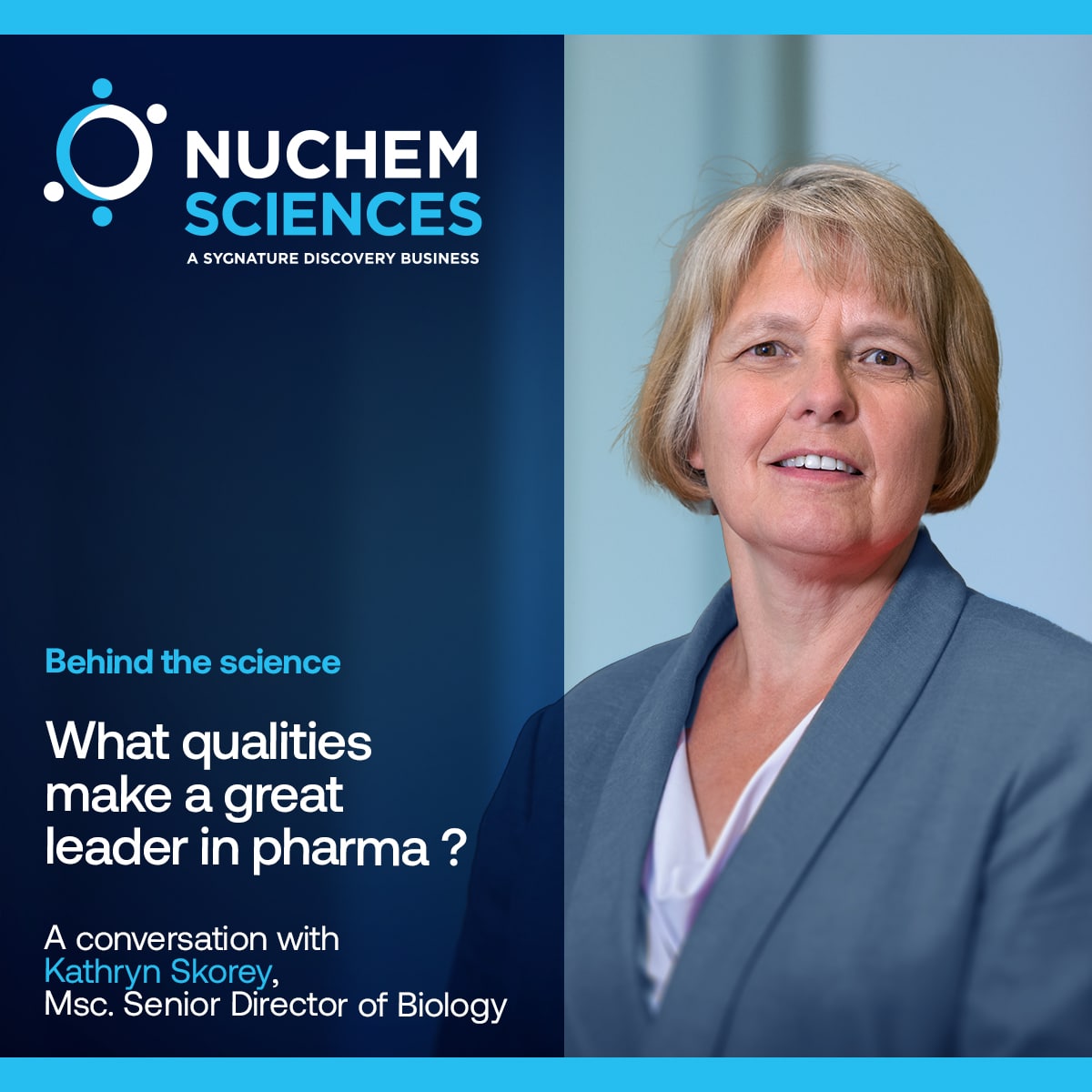What qualities make a great leader in pharma?
A conversation with Kathryn Skorey.
Born with a natural curiosity and determination to learn, Kathryn Skorey became one of the first biochemistry scientists to be hired at Merck Frosst’s Montreal site.
Now, as Senior Director of Biology at NuChem Sciences, Kathryn not only leads a team of biologists in their search for better drugs – she invests herself in her staff’s learning and success.
Kathryn took some time to talk about what it takes to be a great leader, the importance of honesty and transparency, and her achievements beyond drug discovery.

What initially inspired you to become a scientist?
I have always had a drive for curiosity, which eventually led me down the pathway to a career in science. Even when I was struggling with chemistry in high school, I was still passionate about it.
The biggest influence on my career path was my brother-in-law, who brought me to his lab at Queen’s University. That moment was really inspiring.
What does a typical day look like at NuChem?
I do a lot of what I would classify as leadership, rather than typical management. A normal day is probably spent examining projects, communicating with clients and my team and coaching my staff. My door is always open, so my team are always able to come in and tell me if something isn’t working.
I also spend my time trying to pass on my knowledge and experience in the fields of enzymology and protein chemistry to my team. Now, they are becoming more and more experienced and independent in their own right. I don’t necessarily manage what they do – I oversee it.
Does being a leader come with its own set of challenges?
Of course! But we should never be afraid of challenges or conflict. Those moments are when you, as the coach, grow the most.
Obviously, it’s always easy to manage things when all is well. However, you don’t learn or grow from those moments. When things aren’t going well or a project is demanding, you’ve got to find a way to solve it by thinking outside the box. That’s when you learn.
The same goes for helping your team. When a member of staff walks in and tells you that they are facing professional or personal difficulties, leaders need to ask themselves: “What can I do to help them?”
So yes, there are challenges. But wouldn’t it be really boring if everything was perfect?
How has NuChem been able to build its team of talented scientists?
Through lots of interviews and being willing to say no to some candidates. We do turn people down if there’s a personality clash, or if they don’t have the knowledge that they should have early on. Nobody is going to walk into a job knowing everything, so we look for people who are trainable, enthusiastic and who really want to learn. They need to have that natural curiosity and determination.
What achievements have you been most proud of in your career?
For me, it always comes down to my people. My biggest achievement is to have watched the growth of my staff – seeing them come in as research assistants and going on to gain experiences and become leaders in their own right.
Drug discovery can be a challenging field, especially in the CRO industry. What keeps you motivated?
For me, it would be the fact that I can be a leader, mentor and coach to a new generation of scientists. That’s what keeps me coming in the door every day.
I’m also naturally curious, so being in a role where I can learn continually is great. I have not stopped learning since I started my career.
Also, working in a CRO means we need to continually examine new topics and approaches to stay on top of what’s emerging. That keeps me going.
In your opinion, what does NuChem offer the client in terms of value?
We bring innovation. That word tends to be overused, but it’s very accurate in our case. We come up with methods and ideas that are completely outside of what people consider the norm. The ideas we share with our clients are groundbreaking and they can be patented by our clients.
In addition, there are very few organizations that can do medicinal chemistry as well as we can. The employees we brought in from Merck have that expertise. Again, medicinal chemistry is very much about innovation and dreaming up different kinds of approaches. If you’re not in that field, you might wonder why it’s important to make a slight change in a molecule. If you are a great medicinal chemist, you know that it has the potential to change things completely. That understanding is really valuable.
We also place great value on transparency and honesty – these are values that I share. If NuChem wasn’t an honest company, I couldn’t work for them!
What are the personality traits that are most important in a leader?
Leaders need to be visionary, but they must also to share that vision with the people around them. They also need to have a clear plan and be a good listener.
Also, leaders should not be afraid of conflict. The greatest leaders I have met have always been subtly strong, and you wonder: “Where does that strength come from?” It’s because those great leaders immediately recognize when a mistake has been made or when there is conflict. They take immediate steps to deal with those issues and move forward.
What are the values that you live by?
My values are based around honesty, fairness and respect. I respect people, and I expect to be respected in return.
One of the things my mother taught me about children is that if you want to be a good parent, respect your child. They, in turn, will respect you. The same rule applies when you are leading a team.
When you look back at the history of science, what discovery stands out to you?
I think the discovery of DNA has had the biggest impact in terms of the biology industry. Since then, mRNA has become a huge area, as we’ve seen with the COVID-19 vaccine.
There is a wealth of information about previous findings in drug discovery, to the point where it can actually become overwhelming! I would love to see our sector become smarter with our data mining. There is a huge amount of information out there, and we might find ourselves rediscovering things that people already know. In my view, the biggest advancement to come could be the use of AI in data mining.
The importance of emotional intelligence
Throughout her career, Kathryn has spent a lot of time mentoring younger staff members and offering advice to high schoolers with an interest in science. What words of wisdom would she have for her younger self?
“If I had to say something to my younger self, I would say: ‘Learn more about soft skills and emotional intelligence early on’”, she says. “Understanding those things is key to knowing the difference between being a manager and being a leader. I think we’re doing our young people a disservice if we don’t teach them those skills early in their careers.”

Transformer les idées par la science
Société de recherche contractuelle dans la découverte de médicaments et en chimie des procédés.
Services offerts
Nouvelles
NuChem Sciences Inc.
2350 Rue Cohen Suite 201
Saint-Laurent, Québec
Canada H4R 2N6
514 416 5659
